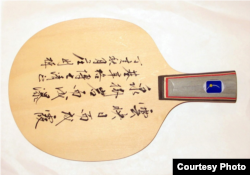Consider this: There are more than 400 museums in the U.S. that celebrate the history of the military.
But not a single one devoted to American diplomacy.
That’s about to change.
A new museum celebrating the history of American diplomacy is being built at the U.S. Department of State. The U.S. Diplomacy Center (USDC) will feature 238 years of American diplomatic history, as well as an education area for students interested in diplomatic careers.
“The USDC project is unprecedented — the nation’s first education center and interactive museum dedicated to inspiring and educating the public about the history, practice and challenges of American diplomacy,” said Kathy A. Johnson, Director of the USDC.
The U.S. Diplomacy Center has collected over 6,200 objects to display in the new, 20,000-square-foot museum. Among them is a portion of the Berlin Wall, after it fell in 1989.
“Diplomacy is not quite the world’s oldest profession, but it remains one of the most misunderstood,” wrote William Burns, a veteran American diplomat.
Burns recently retired after spending 33 years at the U.S. Department of State. He is president of the Carnegie Endowment for International Peace.
The work of American diplomats “has never been more important or more worthwhile,” he wrote in Foreign Policy in October 2014.
However, the American public may not be aware of the contributions of American diplomacy.
Sometimes it is the simple things that can start a diplomatic movement. Among the museum’s collection is a ping-pong paddle given to former Secretary of State Henry Kissinger by Chinese table tennis champion Zhuang Zedong in 2007. Zhuang’s chance meeting with a member of the U.S. table tennis team in 1971 led to “ping-pong diplomacy” with China during the early 1970s, said the USDC.
Kissinger’s diplomacy led to an historic accord between China and the United States. It was the first U.S. contact with China since the Communists had come to power.
The museum will show the achievements of American diplomats from the earliest days of the country. Benjamin Franklin, for example, was America’s first U.S. diplomat who won support for the American Revolution and negotiated peace with Great Britain.
Although the USDC is still under construction, it has a social media presence. Their Facebook and Twitter posts showcase USDC artifacts, highlight dates in U.S. diplomatic history, and promote their ongoing education programs.
In addition, the USDC website Discover Diplomacy draws about 140,000 unique visitors per month. It “provides snapshots of work that U.S. diplomats conduct on a variety of issues around the world,” according to the USDC.
The new museum will have a special hall devoted to education. Students can engage in mock diplomatic talks. The goal is to inspire young people to pursue careers in diplomacy. There will also be interactive maps and displays to illustrate how an embassy functions.
“We are building partnerships with universities and community colleges around the country that will enable us to develop conferences, programs, and media tools tailored to a student audience,” said Johnson.
Building started on the museum in 2014. Secretary of State John Kerry, along with five former Secretaries of State, were present for the ceremony. Once all the funding and design plans are completed, the museum is projected to open in 2017, said a spokesman for the project.
Private sector donors have provided $47 million to build the museum, according to the Diplomacy Center Foundation. The Foundation is a non-profit organization that is raising the money for the museum from various corporations, individuals and foundations. It still needs to raise an additional $20 million.
I’m Mary Gotschall.
Mary Gotschall wrote this story for Learning English. Kathleen Struck was the editor.
Do you have an opinion about this topic? Let us know what you think in the Comments section below, or on our Facebook page.
______________________________________________________________
Words in This Story
museum – n. a building in which interesting and valuable things (such as paintings and sculptures or scientific or historical objects) are collected and shown to the public
diplomacy – n. the work of maintaining good relations between the governments of different countries
unprecedented – adj. not done or experienced before
interactive – adj. designed to respond to the actions, commands, etc., of a user
ping pong – noun phrase table tennis
snapshot – n. a quick view or a small amount of information that tells you a little about what someone or something is like
donor – n. a person or group that gives something (such as money, food, or clothes) in order to help a person or organization
mock – adj. done or performed to look like the real thing.
projected – v. to plan or estimate something for the future






